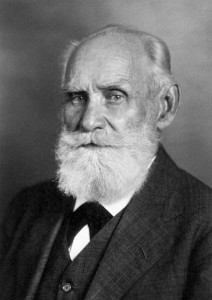
| Born: Sep 26, 1849 in Ryazan, Russia |
| Died: Feb 27, 1936 (at age 86) in Leningrad, Soviet Union |
| Nationality: Russian |
| Fields: Psychology |
| Famous For: Classical conditioning |
| Awards: Nobel Prize in Physiology or Medicine (1904) |
Ivan Pavlov was an eminent Russian physiologist. His intellectual giftedness and instinct for research led him to formulate a conceptual theory that highlighted the importance of conditioning and associating behavior with the nervous system.
Birth and Early Life
Ivan Pavlov was born on September 14, 1849, in a small village in Ryazan, Russia, where his father was a priest. He went to a church school and later a theological seminary. Despite the fact that the main focus of his early studies was theology, his future interests were greatly inspired by Ivan Sechenov’s and Charles Darwin’s work.
He soon gave up religious studies in order to pursue scientific studies. In 1870, Ivan enrolled at St. Petersburg University where he studied physiology and chemistry. In 1875, he received a degree in Natural Sciences. He later joined the St. Petersburg Imperial Medical Academy where he studied medicine under S.P. Botkin, a famed physiologist of that time. He studied about the nervous system and in 1883, he completed his dissertation.
Pavlov’s Career
After his graduation, Ivan studied under Carl Ludwig, a cardiovascular physiologist in Leipzig, Germany, and Rudolf Heidenhein, a gastrointestinal physiologist in Breslau, Poland. Under Heidenhein, he was able devise an operation that involved the creation of an exteriorized “pouch” on the stomach of a dog and maintained nerve supply in order to properly study gastrointestinal secretions. After that, he spent two more years at a lab in St. Petersburg where he was researching blood pressure regulation and cardiac physiology.
In 1890, he helped found the Department of Physiology at the recently established Institute of Experimental Medicine. Pavlov was then appointed the professor of Pharmacology at the Imperial Medical Academy and was appointed as its Chair of Physiology five years later.
During that time, his research was focused on the secretions of digestion in dogs. He found out that his subjects salivated before food was delivered. In a series of experiments, he presented different stimuli before presenting food. In one of the experiments, he sounded a tone immediately before presenting dogs with food. The sound conditioned the dogs to start salivating. His observations led him to formulate the concept of conditioned reflex. He also found out that the reflexes originated from the cerebral cortex.
Contributions to Psychology
Despite the fact that he was not a psychologist, Pavlov majorly influenced the field. His research and discovery on reflexes was a major contribution to the development of behaviorism. His work was often cited in the writings of John B. Watson and other famous psychologists. Pavlov’s research also demonstrated various techniques of studying different reactions of an object to environmental changes.
Achievements and Awards
Ivan Pavlov received the Nobel Prize in 1904 for Physiology or Medicine. In 1907, he was elected the Academician of the Russian Academy of Sciences and he was awarded an honorary doctorate from Cambridge University in 1912. In 1915, he received the order of the Legion of Honor.
Pavlov’s Death
Ivan Pavlov remained devoted to his lab work until his death at the age of 86 on February 27, 1936, from natural causes.